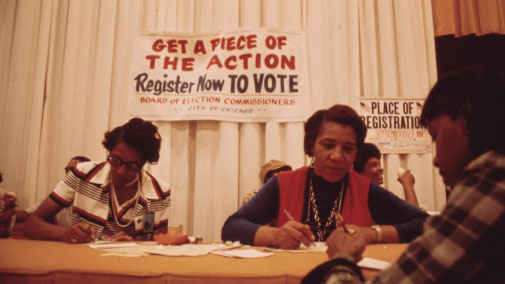
Voting Rights & Election Law
Browse and search through a collection of thousands of subject-coded titles that illustrate the nuances and complexities of elections and voting systems—the lifeblood of democracy—both in America and across the globe.
3,763
TITLES
4,864
VOLUMES
1,453,263
PAGES
About the Voting Rights & Election Law Database
Discover the power of the electoral process with HeinOnline’s Voting Rights & Election Law database! Because free and fair elections are the backbone of thriving democracies, this comprehensive collection has been meticulously curated to help users understand the nuances of electoral systems around the world. With thousands of titles covering topics ranging from absentee voting to voting rights, this database offers unparalleled access to information surrounding historical and recent elections at both the federal and local levels.
Significantly, our editors have carefully analyzed each title and assigned unique title-level subjects, making it easy for you to browse and search for information on specific research topics. With thousands of pages of content on elections in countries from Afghanistan to Zimbabwe, this database provides a truly global perspective.
Alongside books, reports, legislative histories, and more, Voting Rights & Election Law includes hundreds of scholarly articles hand-picked by our editors. These articles provide insights into both historical and contemporary issues, with new content added monthly. Additionally, our bibliography of recommended titles provides you with the tools you need to take your research beyond HeinOnline.
Title List: KBART (TXT) | CSV | HTML
Understanding Electoral Systems
The electoral system represents how people collectively make decisions and participate in their governments. The United States, along with the United Kingdom, France, Germany, and much of the Western world, participate in a representative democracy, in which people elect officials to create legislation and govern on their behalf. Meanwhile, other countries utilize a direct democracy, in which the electorate decides policy and governs without elected representatives as middlemen.
Electoral systems, or how people vote, vary from country to country, and regionally from state to state or municipality to municipality. Within these systems, there are variances on rules and regulations regarding campaign financing, suffrage, voter registration, legislative redistricting, and more.
Featured Content
Content will continue to be added regularly!
Unique to this database is a compilation of the 10 most-cited authors in HeinOnline who write on voting, elections, campaign finance, and related topics. To compile this list, our editors looked at an author’s total number of Cited by Articles, Cited by Cases, and Cited by ALI ScholarCheck statistics, limiting our analysis only to election-related articles.
The chart also includes links to each author’s Author Profile Page, allowing users to further dive into each author’s scholarship. Furthermore, the list will be recompiled yearly to stay current.
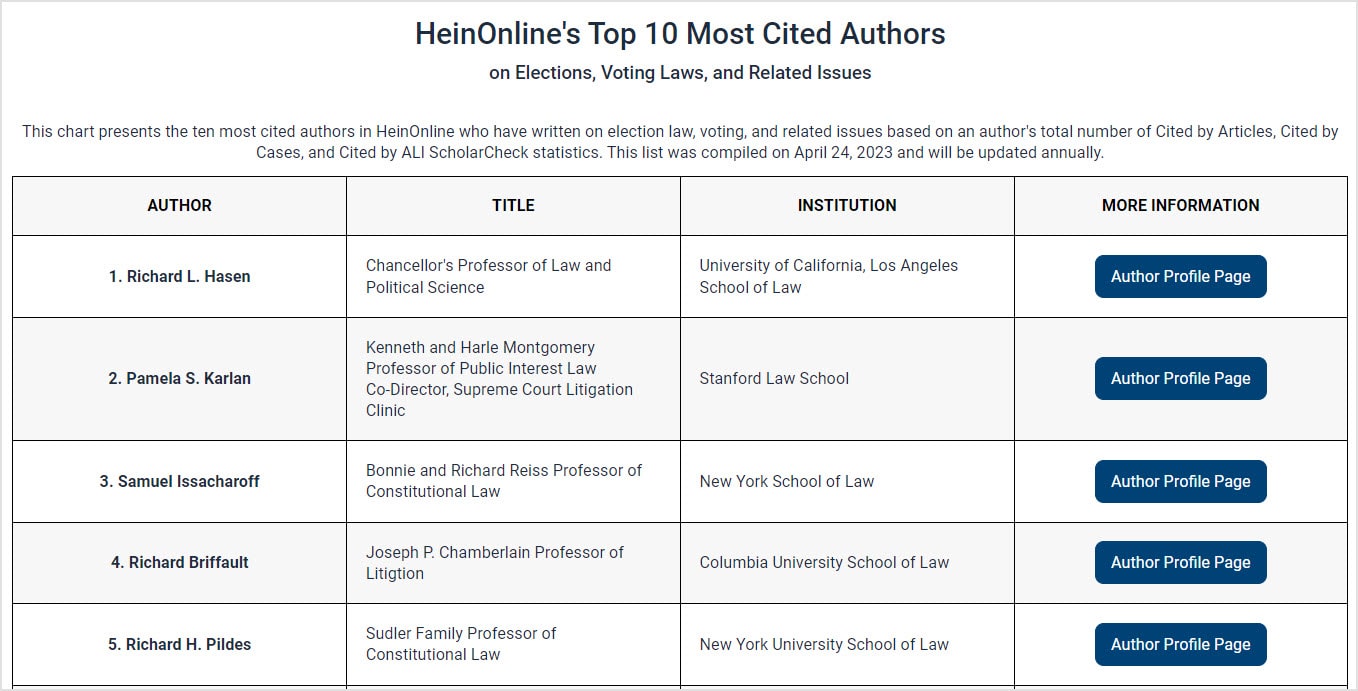
Browse more than 1,000 books ranging in date from the late 1600s to present day, including pamphlets arguing for (and against) women’s suffrage, reports charting voting trends, accounts of scandalous election tampering of the past, and more.
Some titles you may want to check out include:
- Arthur C. Ludington. American Ballot Laws, 1888-1910 (1911)
- Richard C. Pilger. Federal Prosecution of Election Offenses (8th ed.) (2017)
- Aram Goudsouzian. Men and the Moment: The Election of 1968 and the Rise of Partisan Politics in America (2019).
- John Simeon. Treatise on the Law of Elections, in All Its Branches (2nd ed.) (1795)
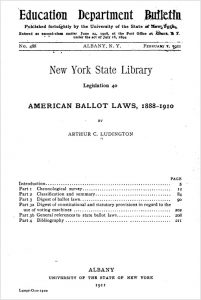
The Brennan Center for Justice
The Brennan Center for Justice is an independent, nonpartisan law and policy organization. While the Center’s complete archive of publications is available in HeinOnline in its own dedicated collection, extracted within Voting Rights & Election Law are select publications centering on voting rights, elections, campaign financing, and other related topics.
For example, selected reports include:
- After Citizens United: The Story in the States (2014)
- Eliminating Barriers to Voter Registration for People with Felony Records (2003)
- Securing the Nation’s Voting Machines: A Toolkit for Advocates and Election Officials (2018)
The American Law Institute
The American Law Institute is the leading independent organization in the United States producing scholarly work to improve the law. ALI’s Election Administration, the work featured in this database, focuses on two areas of great importance: non-precinct voting and the resolution of disputed elections.
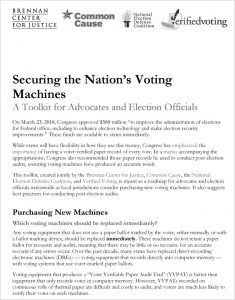
Congressional Hearings
HeinOnline editors have hand-selected more than 700 congressional hearings that provide insight into the federal government’s stances on election-related issues. Hearings of note include:
- Administration of Upcoming Elections (2022)
- Election night coverage by the networks (2001)
- Universal Voter Registration Act of 1977 (1977)
Congressional Research Service & Government Accountability Office Reports
Additionally, we have pulled more than 1,200 relevant reports from the Congressional Research Service (CRS) and Government Accountability Office (GAO), such as:
- Campaign Finance: Constitutional and Legal Issues of Soft Money (2004)
- Funding Of International Election Observers For El Salvador Election (1982)
- National Popular Vote (NPV) Initiative: Direct Election of the President by Interstate Compact (2018)
Legislative Histories
Additionally, this collection includes various legislative histories that showcase the progression of voting and election-related laws, including:
- Legislative History of Federal Election Campaign Act Amendments of 1974
- Legislative History of the Bipartisan Campaign Reform Act of 2002
- Legislative History of the National Voter Registration Act of 1993
Code of Federal Regulations and U.S. Code
The Code of Federal Regulations (CFR) and U.S. Code represent the current statutory positions of the federal government. Our editors have selected sections of the CFR and U.S. Code that are relevant to American election law, such as:
- CFR Title 11: Federal Elections
- US Code Title 52: Voting and Elections
Supreme Court Briefs
Users will find more than 100 Supreme Court briefs that follow the Court’s judgments on various election-related issues. These briefs contain the arguments and positions of parties in the cases.
Some of the briefs in this database include:
- Arizona State Legislature, Appellant, v. Arizona Independent Redistricting Commission, et al. Brief for Appellees (2014)
- Federal Election Commission, Appellant, v. Ted Cruz for Senate, et al. Brief for the Federal Election Commission (2022)
- Beverly R. Gill, et al., Appellants, v. William Whitford, et al., Appellees. Brief of Fairvote and One Nation One Vote as Amici Curiae in Support of Appellees (2017)
Scholarly Articles
Access hundreds of articles* selected by HeinOnline editors on campaign finance reform, gerrymandering, the Voting Rights Act, disenfranchisement, and more. Sort articles by Title, Author, Most-Cited, or Year, or search the list by Title or Author.
*In order to access the scholarly article links, you must be subscribed to the appropriate HeinOnline collection(s).
Additional Bibliography
Take your research beyond HeinOnline with this bibliography of books selected by HeinOnline editors. Each title is linked to its WorldCat entry to help users locate the book in a nearby library.
Browse a variety of serials and periodicals dedicated to voting rights and election law, including:
- Annual Report. Federal Election Commission
- Election Law Journal
- Journal of Election Administration
- Statistics of the Presidential and Congressional Election
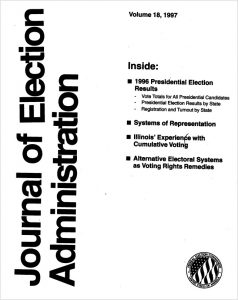
Subject-Coded Content for Simplified Searching
HeinOnline editors have analyzed every title in this collection, assigning each with one (or more) of 16 new title-level, browsable and searchable subjects to help users quickly easily find content related to their research.
Voters who cannot go to the polls on election day to cast their vote can mail in their ballot ahead of time through absentee voting.
Ballot design, access, and types play crucial but invisible roles in election.
How candidates raise and spend money on their political campaigns is highly regulated, greatly scrutinized, and often controversial.
Learn about the nuts and bolts of conducting an election, from staffing polling places to procuring voting machines.
Ensuring that elections are conducted in a way that makes them accessible to all who are eligible to participate and that their results are honored is paramount. Explore how elections are kept free and fair and the tactics used to suppress election integrity.
This subject allows users to examine the outcomes of specific election contests, both domestic and around the world.
Election reform refers to ideas and proposals to the electoral process, from declaring Election Day a federal holiday to abandoning the electoral college.
The electoral college is the process by which the United States elects the president.
The Federal Election Commission (FEC) is a regulatory agency responsible for enforcing campaign finance laws in federal elections.
Gerrymandering is artificially manipulating the boundaries of legislative districts to unfairly favor one political party or class.
Unlike gerrymandering, which is done with dishonest intent, legislative redistricting is the process by which legislative districts’ boundaries are redefined as the result of population changes. Redistricting usually happens every ten years based on census results.
We are all familiar with campaign ads, campaign signs on lawns, and remember the aspirations of past candidates. Explore the inner machinations of running for office with this subject.
Suffrage is the right to vote. Historically, women, people of color, and men who did not own land have been denied the vote. Today, most countries still restrict the right to vote by age and citizenship, but additional restrictions vary worldwide.
For the last ten years, voter identification laws have been passed with increasing frequency, requiring voters to show photo ID at the polls.
In most countries, including the United States, eligible voters are required to register with their local electoral roll. This registration will record a person’s name, address, a copy of their signature, and their political party affiliation (if applicable).
Voting rights in the United States are enshrined in the Fifteenth Amendment of the Constitution and solidified by the Voting Rights Act of 1965. Recent rulings from the U.S. Supreme Court have changed several of the Voting Rights Act’s enforcement provisions. Explore the fundamental—but precarious—right to participate in our democracy.
